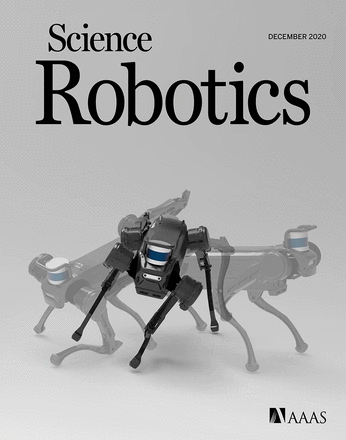Jueying, the dog-like bionic quadruped robot, shows up on the cover of Science Robotics, December 2020 for its agile motor skill newly learned with machine learning methods. The related paper “Multi expert learning of adaptive legged localization” is published online in this issue as a long research article and is selected as the cover paper.
Jueying is developed by researchers from the College of Control Science and Engineering, Zhejiang University, working as a platform for pioneer research on applications of deep learning on robot control. In cooperation with researchers from the University of Edinburg, a multi expert learning architecture (MELA) based on deep reinforcement learning is proposed to train robots to achieve fast and flexible motion response in unknown environment.

During training, MELA is initialized by pretrained neural network (DNN) and trained under the construction of a gating neural network that allows MELA to learn about transitional skills across various modes. During runtime, MELA constantly blends multiple DNNs and dynamically synthesizes a new one to produce adaptive behaviors in response to changing situations. This approach leverages the advantages of trained expert skills and the fast online synthesis of adaptive policies to generate responsive motor skills during the changing tasks. Using one unified MELA framework, the team demonstrated successful multiskill locomotion on a real quadruped robot Jueying that performed coherent trotting, steering, and fall recovery autonomously.
To read the paper, please visit:
https://robotics.sciencemag.org/content/5/49/eabb2174
Reporter: WANG Zhicheng
Editor: WANG Jing
|
College of Control Science and Engineering,Zhejiang University |
|
|
|
|
|
|